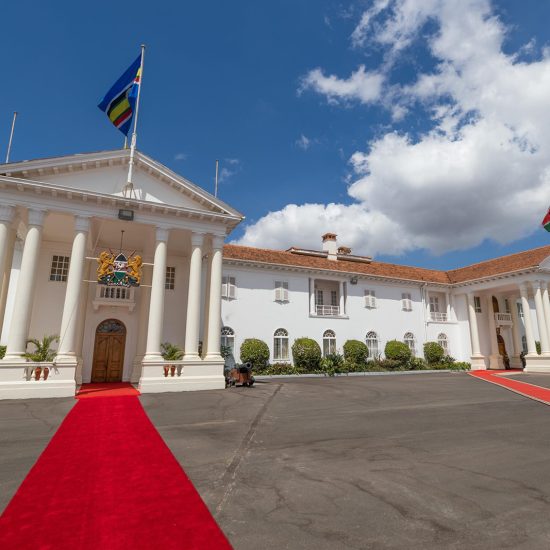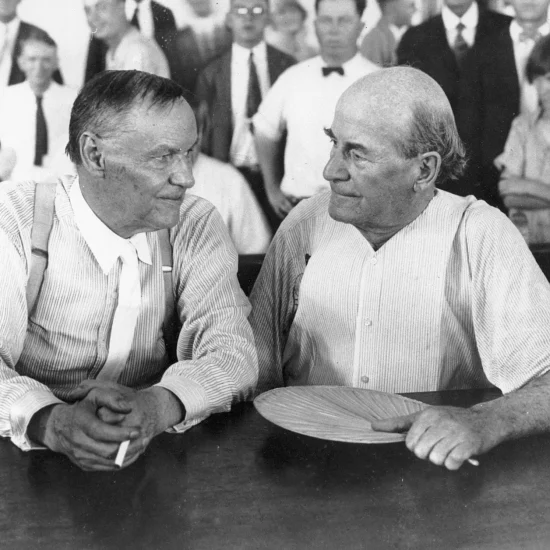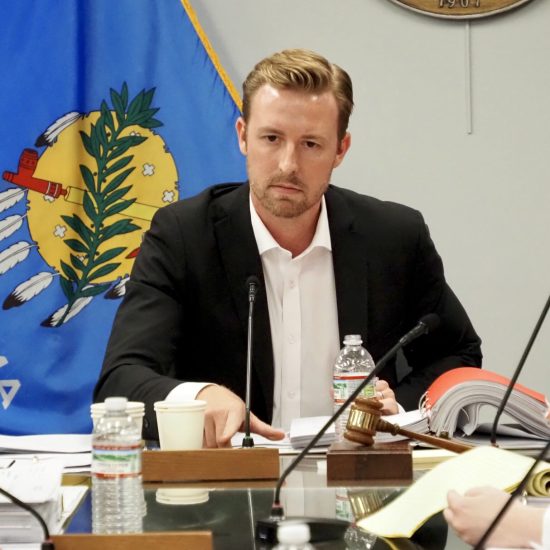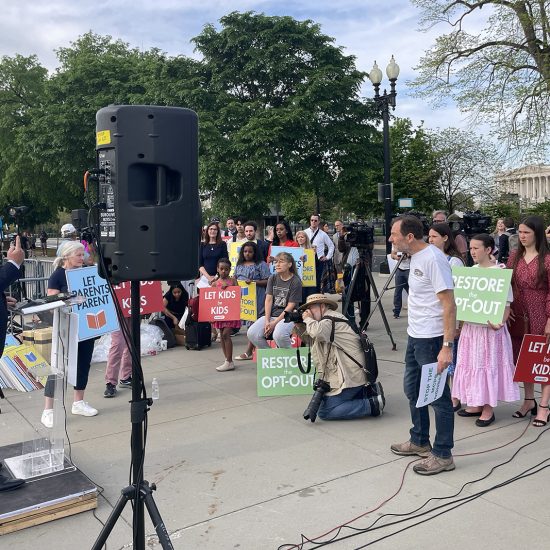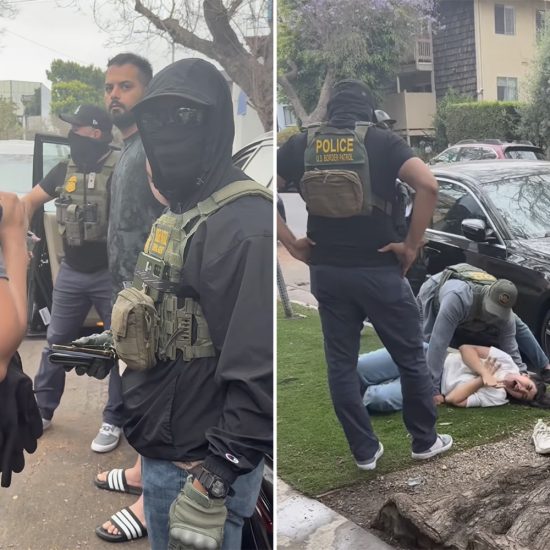Fresh from a four-year stint in the White House, a Baptist scholar in church-state issues offered advice on faith and politics to a packed church in a suburb of Washington, D.C., on March 8. Melissa Rogers, who served as executive director of the White House Office of Faith-based and Neighborhood Partnerships from 2013 until January 2017, spoke to a meeting of the North American Baptist Fellowship, a group that unites 40 Baptist bodies in Canada and the United States. Members of the host church, Columbia Baptist Church in Falls Church, Va., and participants in an advocacy program sponsored by the Cooperative Baptist Fellowship also attended.
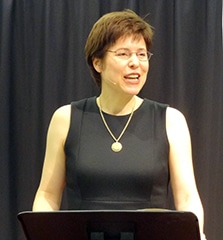 Melissa Rogers speaks to a meeting of the North American Baptist Fellowship in March. (Brian Kaylor/Word&Way)Having just left the White House less than seven weeks earlier, Rogers said “it’s a journey that I’m still reflecting on.” She added that she saw her own church’s ministries “in new light having worked in government” and “came to a deeper appreciation of them.”
Melissa Rogers speaks to a meeting of the North American Baptist Fellowship in March. (Brian Kaylor/Word&Way)Having just left the White House less than seven weeks earlier, Rogers said “it’s a journey that I’m still reflecting on.” She added that she saw her own church’s ministries “in new light having worked in government” and “came to a deeper appreciation of them.”
“I was so pleased that I could be a strong person of faith serving in government,” she said. “In the United States, you can be a strong person of faith and have your faith be something that is often consistent and complimentary to the work of government — not always, but many times. And you can serve in government no matter what your faith because there is no religious test for public office.”
Rogers told stories from her time in the White House that showed “common ground between government and religious organizations” and “a willingness on both sides to collaborate.” This included the fight against Ebola in Africa and efforts to win the release of two Christian missionaries imprisoned in other countries — Kenneth Bae in North Korea and Saeed Abedini in Iran. Rogers said advocacy by Christians and others bringing attention to the cases of Bae and Abedin and urging U.S. officials to act “made a real difference.” The U.S. helped secure the release of Bae in 2014 and Abedini in 2016.
“These were victories not just for these men and their families and the United States government, but also for the many — including many in this room — who prayed and pressed for their release,” Rogers added.
Even as Rogers urged greater Baptist engagement with government, she also defended the historic Baptist position of seeking separation between church and state. Roger previously served as general counsel for the Baptist Joint Committee for Religious Liberty.
“We should not expect the state to do our job,” Rogers explained. “Promoting religion is the job of religious individuals and institutions — and as Baptists we know that teaching. I believe that’s not only what the Bible teaches, but it’s what’s best for the church.”
“When we see that government begins to control religion,” she added, “what we’re left with is something that’s a funhouse mirror of faith.”
Tips for Public Engagement
Rogers focused much of her talk on offering advice for Christians seeking to engage with government, which she believes Christians should do. She said that “what must come first” is “Christian organizations must always be authentically Christian.” Rogers warned it remains easy “to lose our way” and “get distracted,” so Christians must avoid accepting political teachings and expectations that run counter to scriptures.
“It is challenging to walk as Jesus commands and be engaged in the political system, but it is possible — and I know it’s possible because I witnessed it, I’ve seen it done,” Rogers said. “Christian organizations must check and recheck their agendas to ensure that its driven by biblical teachings and not by other demands.”
“To be authentically Christian means to be counter-cultural,” she added. “We have to be counter-culture to be salt and light in the world and if we’re not we lose the flavor of the salt, we lose the light.”
Rogers also urged Christians to remember biblical teachings to “don’t give into fear” and “to be wise as serpents and gentle as doves.”
“We always have to be careful that we are never used as a tool by government, but always as an independent actor that is acting on the teachings of our faith in collaboration with government,” she said. “We need to tell the truth. There is no ‘fake news’ in the gospel. And we need to hold faith-based institutions — including media faith-based outlets — to this standard.”
Based on her experiences outside and inside the White House, Rogers offered five “suggestions on how religious organizations can more effectively advocate causes before and with government.”
“First, don’t wait for an invitation from government officials before engaging with them,” she said. “If you wait, you’ll probably be waiting a long time.”
Rogers therefore urged the Baptists present to introduce themselves to their governmental officials at all levels, offer ideas, keep in touch and speak publicly on moral issues.
“Second suggestion: find a balance between prophetic and pragmatic,” Rogers offered. “This is a struggle that I think everybody has who engages with government.”
Her third suggestion reminded the audience that “a good idea is not enough.”
“We had people coming to us all the time with good ideas — and good ideas are wonderful — but for a good idea to be executed by government it has to be something that government literally can do — which is not always the case — and it also has to be something that has a level of support,” Rogers explained.
She quickly added that good ideas that do not yet have enough support to attract the attention of governmental officials could get there if individuals and organizations first do the hard work to promote it and build a coalition to support it.
“Fourth, know your audience,” Rogers said. “Usually your audience is politicians and their staff.”
She said that while “politicians generally want to do the right thing, almost all of them, however, also want to get high approval ratings to get reelected.” Thus the “political prism” through which most politicians consider supporting an idea is deciding if it will help them get reelected. While Rogers warned, again, against letting political factors change Christian beliefs, she explained the need to frame ideas so politicians will care. Such framing includes helping politicians understand “the secular aspects of the issue” since politicians will need to defend the proposed idea to non-religious constituents and groups.
The final suggestion from Rogers: “go upstream.” She explained the importance of getting ideas on the public agenda during campaigns instead of merely waiting to talk to elected officials. Rogers quickly stressed “that does not mean that you want to be engaged — as a representative from a religious organization — in electioneering with partisan politics.” Instead, she argued “religious groups should seek meetings with all the candidates for a particular office during a campaign” in hopes of putting issues on the campaign agenda and “get the attention” of the person who will hold the office.
Roger ended her presentation by encouraging Baptists to not give up and to keep working “as we seek to make a positive difference in the lives of people across the country and around the world.”
“As easy as it can become — especially these days — to get cynical or overwhelmed,” she added, “remember that your work matters greatly and can work amazing feats even in today’s world.”

